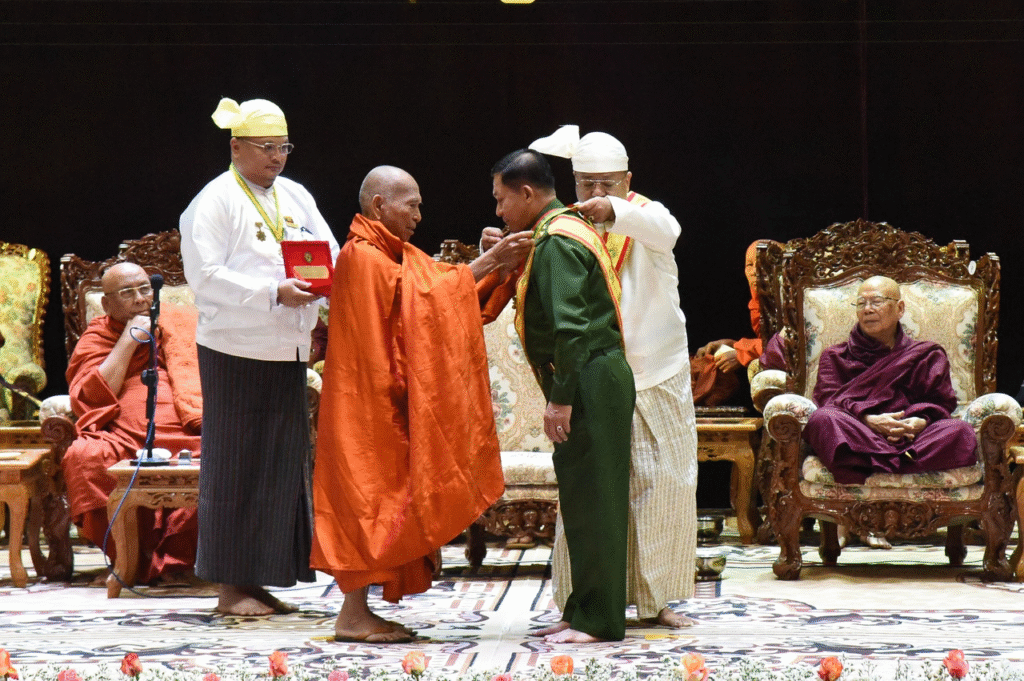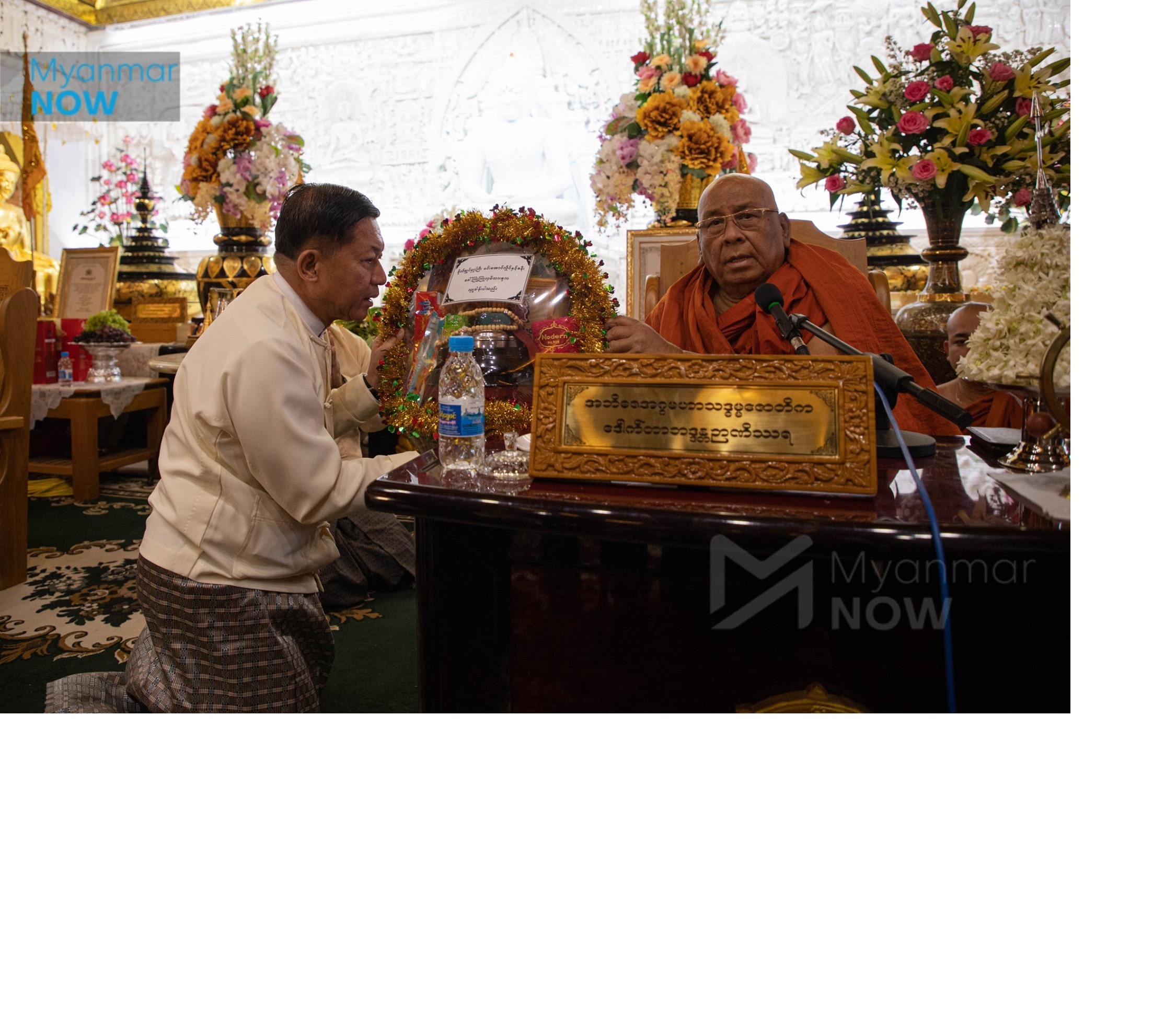This article examines the transformation of one of Myanmar’s most revered monks, Sitagu Sayadaw, from a respected preacher of royal ethics to a controversial figure aligned with the military. It reflects on how religious nationalism and Islamophobia, once exploited to secure political power, continue to endanger Myanmar’s fragile unity. In connecting past and present, it reminds readers that the Spring Revolution’s true victory depends not only on defeating tyranny, but also on rejecting hatred in all its forms.
This commentary reflects the author’s personal views and aims to promote interfaith understanding and national reconciliation.
Under Military Rule: The Fearful Burmese Public and Sitagu Sayadaw’s Controversial Sermons
Living under the reign of terror imposed by the military regime, the people of Myanmar once regarded the sermons of the revered monk Sitagu Sayadaw—notably his discourse on Rajavāda (The Ten Duties of Kings) and his post–2007 Saffron Revolution sermons such as “The Paths Taken by Fools”—as traditional teachings worthy of respect.
However, the image of Sitagu Sayadaw began to change during the 2010 transition to democracy, when he gradually emerged as a monk sympathetic to and supportive of the military. By the time of the 2021 coup, his alignment with the junta had become unmistakable, leading to a surge of public criticism and disappointment among former followers.
Another controversial aspect of Sitagu’s preaching is his frequent reference to the idea that Buddhism declined because of the invasions of Islam. In his sermons, he often cited historical examples such as Afghanistan—the land of King Milinda—and Pakistan, home to the ancient Buddhist university of Taxila, once the center for teaching the Jātaka Tales. He claimed that these Buddhist lands had fallen under Islamic domination, implying a civilizational loss.
Through such remarks, Sitagu portrayed himself as a protector of Buddhism in Myanmar, while at the same time encouraging resentment and suspicion toward non-native or non-Buddhist communities, particularly Muslims.
In July 2013, at a meeting of the Interfaith Protection and Preservation Association in Yangon’s Insein Township, Sitagu Sayadaw delivered a sermon claiming that ancient Buddhist pagodas near Theingyi Market in downtown Yangon had disappeared and been replaced by Muslim mosques. This sermon, too, fueled sectarian hatred and was seen as part of the growing wave of anti-Muslim nationalism in Myanmar.
Sitagu Sayadaw’s Moral Decline and His Words That Justified Violence
In May 2017, during a sermon delivered at a military religious ceremony, Sitagu Sayadaw made a shocking claim—that killing those who do not fully observe the Five Precepts does not result in great sin (akusala). This statement marked a turning point in his moral downfall, sparking outrage and deep concern among the public and the Buddhist clergy alike.
Soon after that sermon, Rohingya armed group ARSA attacked several border guard posts in Rakhine State. The Myanmar military launched a brutal clearance operation in response, raiding and burning Rohingya villages across northern Rakhine and massacring thousands of civilians.
According to the logic implied in Sitagu’s sermon, those victims—because they were not Buddhists—would not bring significant demerit upon the killers. Such a terrifying interpretation of Buddhist ethics provided what appeared to be a spiritual justification for the military’s bloodthirsty actions.
After the 2021 coup, Commander-in-Chief Min Aung Hlaing openly declared in his Armed Forces Day speech on March 27 that he had “cleansed the nation of the Bengali terrorists,” a phrase widely understood as a reference to the Rohingya genocide.
Meanwhile, Sitagu Sayadaw continued to praise Min Aung Hlaing as a righteous and noble protector of the Sasana (the Buddhist religion) and to lend explicit support to the junta’s actions. As a result, he has come to be regarded by much of the Burmese public with revulsion and disappointment—a tragic fall from grace for a once-revered monk.
In contrast, the younger generation of 21st-century Myanmar, now more educated and critically minded, no longer accept traditional authority blindly. They have begun to openly denounce figures like Sitagu, rejecting religious hypocrisy and political complicity.
This awakening of conscience and courage to challenge false moral authority represents, in itself, one of the quiet victories of Myanmar’s Spring Revolution.
The Return of Weaponized Islamophobia
Even as Sitagu Sayadaw’s moral decline has become a cautionary tale, his “comrade” in extremist rhetoric — U Wirathu — continues to fan the same flames of Islamophobia. Sitagu himself once called Wirathu his comrade at a Ma Ba Tha ceremony, revealing how the movement’s religious symbolism was politically weaponized to secure votes for the military-backed USDP.
A widely circulated photograph once showed Sitagu visiting Wirathu in prison, where Wirathu — wearing the blue prison garb after being de-robed — appeared to be “re-recruited” into the fold. That symbolic act spoke volumes: the alliance between militant monks and military power was not accidental, but strategic.
Today, this resurgence of anti-Muslim sentiment is no longer confined to the Bamar Buddhist mainstream. Disturbingly, some Rakhine nationalists aligned with the Arakan Army, and even certain Christian ethnic minorities — particularly from Chin, and a few from Kachin and Karen backgrounds — have echoed Islamophobic narratives on Facebook and TikTok.
Such trends are deeply alarming. The Spring Revolution, born from shared suffering and a vision of inclusive freedom, risks being undermined from within by old hatreds. If racism and sectarianism resurface, Myanmar’s democratic struggle will lose both its moral core and its international solidarity.
The true success of the revolution will not be measured only by the fall of a dictator, but by whether Myanmar’s people can rise above prejudice and build a nation where no faith or ethnicity is demonized again.

Credit: သီတဂူ ကျဆုံးမှုသည် နွေဦးတော်လှန်ရေး၏ အောင်မြင်မှုတစ်ခုဖြစ်သည် by ဆွေဝင်း





